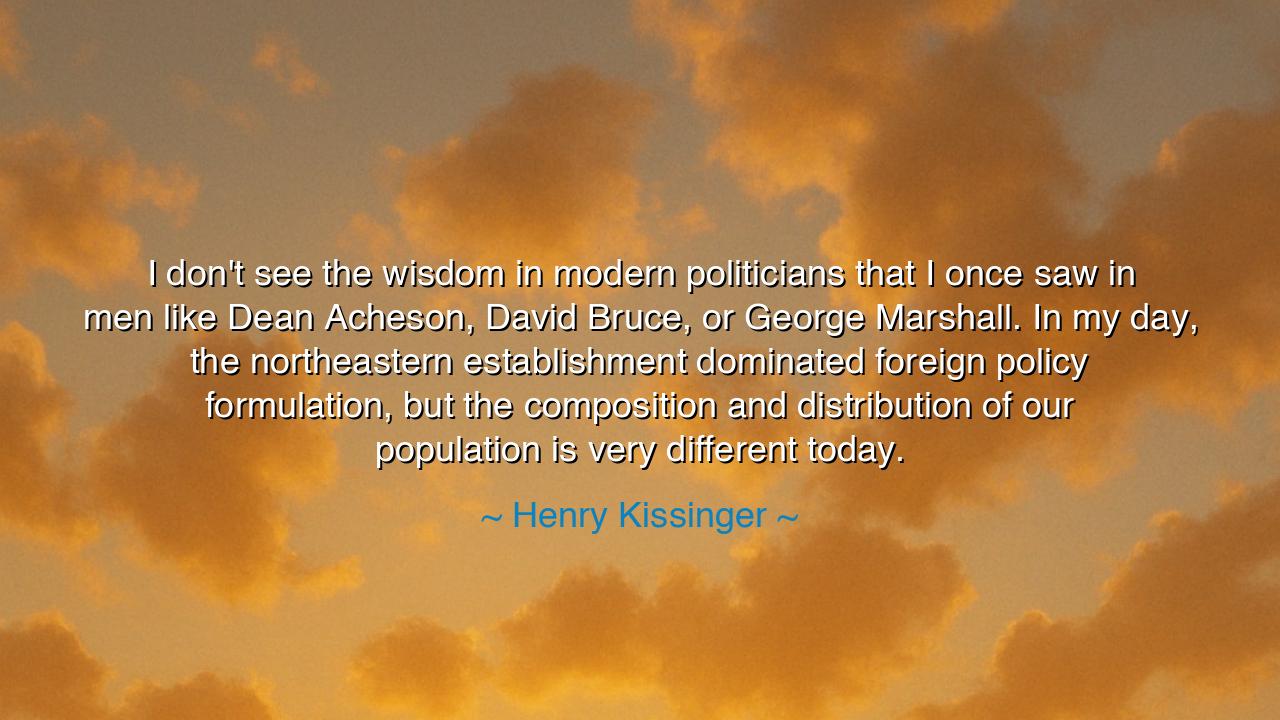
I don't see the wisdom in modern politicians that I once saw in
I don't see the wisdom in modern politicians that I once saw in men like Dean Acheson, David Bruce, or George Marshall. In my day, the northeastern establishment dominated foreign policy formulation, but the composition and distribution of our population is very different today.






Hear me, O children of the future, for I bring to you a reflection from the great statesman Henry Kissinger, whose words echo with the wisdom of an era gone by: "I don't see the wisdom in modern politicians that I once saw in men like Dean Acheson, David Bruce, or George Marshall." In these words, Kissinger laments the passing of a time when statesmen were revered not just for their political acumen, but for their deep understanding of history, diplomacy, and the long-term consequences of their actions. These men, Acheson, Bruce, and Marshall, were giants of their age, whose wisdom was born not just of intellect, but of experience and a profound commitment to the principles that shaped the world.
In the days of Marshall and his contemporaries, foreign policy was not crafted for short-term gain, but for the future of nations and the stability of the world. The Marshall Plan, which he designed to rebuild a ravaged Europe after the Second World War, stands as a testament to the foresight and wisdom of men who understood that true power lies not just in military might, but in the ability to forge lasting relationships and promote peace through economic stability. These men understood that diplomacy and careful strategy, guided by the lessons of history, were the tools by which nations could navigate the complexities of the world stage.
Yet today, as Kissinger observes, the landscape of foreign policy has changed. The composition and distribution of the population has shifted, and with it, the very nature of political leadership. In an age of media, instant communication, and shifting global alliances, the art of statesmanship often gives way to short-term politics. The focus is not always on the long-term consequences of decisions, but on the immediate appeal to the masses. This has, in some ways, diluted the wisdom that once guided the affairs of nations, replacing it with the sound and fury of populist rhetoric and quick fixes.
Consider the example of Dean Acheson, who, as Secretary of State, played a crucial role in the shaping of American foreign policy during the Cold War. His wisdom was not in pleasing the masses, but in maintaining a vision for a stable world. Acheson’s firm stance on containing the spread of Soviet influence was rooted in an understanding that peace could only be achieved through strength tempered by diplomacy, and that alliances must be built on trust and mutual respect. His foresight and commitment to long-term strategy, rather than immediate gain, marked him as one of the great minds of his era.
So, O children, let the wisdom of the past guide you in the world of today. Statesmanship is more than the pursuit of popularity; it is the careful shaping of a world that balances power, diplomacy, and principle. Marshall, Acheson, and Bruce understood that the true measure of a leader was not in how they were perceived, but in the legacy they left behind. It is in this wisdom, rooted in deep knowledge of the world and an unwavering commitment to the greater good, that we find the true leaders of history. Let this be your guide, for in the quest for power and influence, it is wisdom that must always lead the way.






LTHien Ly thi
This quote raises questions about the relationship between societal structure and leadership competence. Is Kissinger suggesting that changing demographics inherently reduce the quality of leadership, or that modern politicians operate under different pressures and constraints? I’m curious whether the wisdom he references is context-specific to the Cold War era or whether it represents timeless qualities. How do shifts in population, education, and culture influence the skill set required for effective foreign policy today?
LLathienlam
Reading this, I’m struck by the tension between institutional experience and modern political diversity. If foreign policy used to be dominated by a specific elite, does that mean homogeneity was essential for strategic success, or was it just a historical accident? How might the broader composition of today’s political leadership affect decision-making quality, innovation, or ethical accountability? I also wonder whether nostalgia for past leaders could bias our judgment of current policymakers unfairly.
UGUser Google
I find this perspective intriguing but somewhat elitist. Does it imply that contemporary politicians lack the gravitas or knowledge of past northeastern establishment figures? Could the changing demographic landscape actually bring fresh insights that old structures could not accommodate? I’m interested in exploring whether Kissinger sees the decline of traditional elites as a loss of wisdom or simply a reflection of inevitable social evolution. Are we valuing style and accessibility over substance today?
Lloccc
This statement makes me wonder whether Kissinger’s critique is rooted more in nostalgia than objective assessment. Is he suggesting that the ‘wisdom’ of past leaders was a product of their time, education, or social background? How much does the demographic shift and diversification of the population influence the quality of foreign policy? I’m also curious if this reflects a broader concern about expertise versus populism in modern politics, and whether different voices necessarily dilute competence.